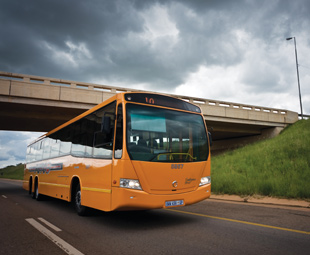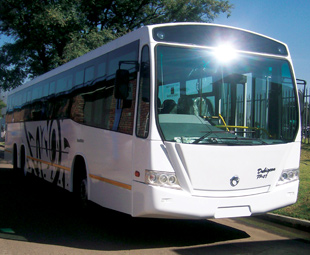Driving the nation

Transporting Johannesburg’s commuters from point to point while keeping them safe on the country’s notoriously hazardous roads is no easy task, but Putco does so daily, conveying millions of people, with the trusted help of Apollo Tyres South Africa, manufacturer of the Dunlop range of tyres
Potholes, out-of-order traffic lights and poor road surfaces characterise many of South Africa’s roads. With Johannesburg being the economic capital of Africa, traffic conditions increase the problem even further. Along with this comes the need to transport millions of commuters safely and reliably and Putco is the company doing just this.
The bus company therefore requires tyres that go beyond robust, and are able to withstand harsh braking, cornering and curbing. Apollo has worked closely with Putco to develop tyres specially suited to Putco’s needs and the two companies have successfully worked hand in hand to determine the requirements and deliver on these specific product requests.
“The Dunlop family has always had a special relationship with Putco,” says Keith Phelps, national services manager for Apollo Tyres South Africa. “The company transports countless people and we have to work closely with Putco to ensure their safety.”
Choosing Apollo Tyres South Africa as its main supplier was an obvious choice for Putco – Apollo provides an outstanding overall service on top of its top-quality Dunlop products. Phelps elaborates, “Apollo supplies 100% of Putco’s tyres, but Putco does allow for a 20% evaluation programme which we welcome as it keeps us on our toes!”
On top of developing and supplying tyres specifically for Putco’s needs, Apollo carries out constant monitoring in order to ensure the tyres are being used to their optimal capacity. This monitoring involves regular scrap analysis, route surveys and load studies. “If any fault is found with the tyres, it is taken extremely seriously by Putco, and action is taken immediately,” says Phelps.
Apollo conducts scrap analysis on a weekly basis for Putco. Damaged tyres are removed from the vehicles and immediately sent from individual depots to the Putco group’s own retreading facility. Apollo then conducts an analysis of these tyres to assess the cause of the damage in each and every case.
 “This data is stored at Apollo’s offices in order to make assessments and decisions on what action is to be taken,” explains Phelps. “If, for example, we see that a large number of buses from a particular depot are returning with damage as a result of potholes, then we recognise this as a problematic route and a different type of tyre is required for these conditions. Concerns can also be traced to a particular driver or possible bad driving habits, and these problems can then be addressed.”
“This data is stored at Apollo’s offices in order to make assessments and decisions on what action is to be taken,” explains Phelps. “If, for example, we see that a large number of buses from a particular depot are returning with damage as a result of potholes, then we recognise this as a problematic route and a different type of tyre is required for these conditions. Concerns can also be traced to a particular driver or possible bad driving habits, and these problems can then be addressed.”
Regular scrap analysis means that problems are confirmed and attended to swiftly, keeping the vehicles, and therefore the passengers, safer.
As a result of the scrap analysis, Apollo and Putco are able to ascertain how often, and where route surveys and load studies need to take place. “Route surveys are conducted regularly as they are of major importance in understanding which tyres need to be used in particular circumstances, and what needs to take place in terms of product development,” Phelps explains. “Bus routes can change all the time, so these surveys need to happen frequently to ensure the most current information is being used. This is very important for the safety of passengers as well as for keeping costs per kilometre as low as possible, as this ultimately affects the price of a ticket.”
Overloading is one of the most problematic aspects of commuter transportation, so regular load studies are imperative. “We generally close off a section of the road and position the loaded bus onto scales in order to see what the weight on the steer axle is, and also the weight on the drive axle,” says Phelps. “This is necessary to ensure that weight is evenly distributed in order to avoid damage to the tyres. If a certain route is experiencing overloading, it is necessary to increase the bus capacity or the number of buses on that route. Through load surveys Apollo can advise Putco on what action needs to be taken in this regard.” As Phelps points out, conducting these load studies also has a positive influence on the customers as they are able to see directly the lengths Putco will go to ensure their safety.
Obviously also of major concern to commuters as well as other road users, is the reckless behaviour of drivers of commuter buses at times. Putco is addressing this problem through its driver-training programme. “Drivers are carefully selected after a rigorous initial training programme, but the training does not stop there. It is crucial that drivers undergo refresher programmes, and Putco ensures its drivers are retested every two years,” explains Putco managing director Franco Pisapia.
Apollo’s various tyre analyses also help determine negative driver behaviour, which can then be addressed by Putco. “An important aspect of training involves training specifically on tyre management. For example, employees need to be trained to manage the utilisation of matching tyres and also the same tread pattern on the steer axle,” says Phelps. On top of Putco’s own training facilities, Apollo has been brought on board to assist with tyre training. “Putco is putting every effort into making its operation safe, and at Apollo we are happy to provide support,” Phelps says with enthusiasm.
On top of Putco’s already massive operation – with a stable of over 2 000 buses, 4 800 employees and the transportation of over a million people a day – it is also expanding its fleet of luxury coaches. “We have added 11 luxury coaches to our previous fleet of two, and are looking forward to operating this venture successfully during 2011,” says Pisapia.
Keith Phelps adds that Apollo already has a good understanding of the requirements for luxury coaches and will be backing Putco all the way.
2011 is also set to be a year where even further emphasis is placed on environmental sustainability across the board. “Putco is looking into obtaining Euro5 engines, thereby exceeding national minimum regulations. It is also important to ensure energy saving within the company, and effective waste management is a useful way of accomplishing this,” says Pisapia.
Both Pisapia and Phelps agree that working together to develop appropriate tyres for unique situations is the best way to ensure the safety of South Africa’s commuters, as well as to keep costs down. Putco and Apollo certainly seem to have found a winning formula.
Published by
Focus on Transport
focusmagsa



